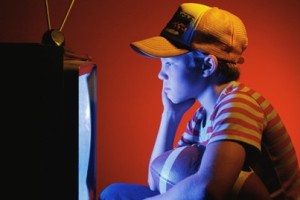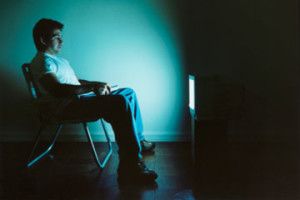I’m sure we were all told by our mothers when we were younger to not sit to close to the television and stare at it for too long otherwise we’ll have poor eye sight. This is not the case. Such a myth has been perpetuated through the ages and stems from the time General Electric came out with colored television sets way back in the 1960s’. Because of the amount of radiation that is let off from the screen, federal health officials deemed them highly unsafe. Not wanting their product to trigger great problems for viewers, General Electric stopped selling them.
Dr. Lee Duffner of the American Academy of Opthalmology does not cause any damage to one’s vision. Like staring at anything for too long, watching television can cause one’s ones to hurt as they are so focused on what is on the screen that the eyes get exhausted staying in one focal region for such a vast amount of time. The solution to this is simple. By turning off the television and shutting your eyes to allow them to rest will ease the tension in them and bring them back to a relaxing and natural state. Televisions pose a greater risk to weight gain and influencing somebody’s behavior than eye sight.
This claim that staring at the tube for long periods was also tested by the Lighting Research Center (LRC). The experiment went like this: have volunteers sit in front of the television for an hour while watching an action movie. The type of television in this experiment was a flatscreen television so that could always have the potential to unintentionally manipulate the results. About 50% of the volunteers were to view the film in a room that was brightly lit. After about an hour, they stopped watching and then returned to finish the film, except only this time the room was not lit up. The researchers decided to run a second trial with a different group of subjects with a twist. In this trial, they went from a non lit up room to a brightly lit up one. Throughout this movie watching in different areas of lighting and no lighting, the individuals had to press a button indicating that they were able to respond to visual cues, while the researchers measured electrical brain activity to see if there was a different from first watching the film and then resuming back to it. Blinking of the eyes were also observed for the study’s purpose. Lastly, the individuals of the experiment had to say if they felt the change in lighting had an impact on their eyesight. What the conclusion of this study showed was there was actually less straining and little fatigue of the eyes when the groups were in a brightly lit room, as opposed to watching in a darker room where eyes had a harder time paying attention. Even though it was more difficult to keep watching in the dark, the team of researchers attributed this to people being tired and that no signs were there to indicate that their eyesight was at all affected.
Sources:
http://athome.readinghorizons.com/blog/why-sitting-too-close-to-the-television-makes-your-eyes-go-square
http://www.drweil.com/drw/u/QAA401506/Can-Watching-TV-in-the-Dark-Hurt-Your-Eyes.html
http://health.howstuffworks.com/human-body/systems/eye/sitting-close-tv-bad-eyes.htm
http://www.scientificamerican.com/article/earth-talk-tv-eyesight/




This post is interesting to me. I feel as though the studies you dressed do not necessarily consider the distance away from the TV a person is, which is likely what could hurt your eyes. I would still argue that staring too closely at screens would ultimately cause eye sight damage. I have often questioned whether staring at a small phone screen all the time has damaged my vision and I would contend that it has. According to an article on the Digital Trends website, it is not known yet if phone use causes long term eyesight damage due to the recent invention of the technology and the lack of completed studies. According to the article, “A 2015 report from The Vision Council, Hindsight Is 20/20/20: Protect Your Eyes from Digital Devices, found that 61 percent of Americans have experienced eye strain after prolonged use of electronic devices — nearly 2 out of every 3 people.” This strain includes, “dry or irritable eyes, blurred vision, eye fatigue, or head, neck and back pain”. I believe that this strain would be present if the screen were a TV instead of a phone as well.
While a person’s eyes might not be damaged by watching too much TV, a recent study found evidence that watching too much TV could diminish intelligence. While the results are interesting, there are some flaws, the study had no baseline tests of cognitive function to compare their results to. http://well.blogs.nytimes.com/2015/12/03/tv-may-be-bad-for-your-brain/?&moduleDetail=section-news-2&action=click&contentCollection=Health®ion=Footer&module=MoreInSection&version=WhatsNext&contentID=WhatsNext&pgtype=Blogs
I find this post rather interesting. For some time now, watching the TV at night hurts my eyes and sometimes gives me a headache. I find the brightness irritating and always believed it was effecting my vision. It is nice to know that according to the studies you posted, this is not the case.
Something interesting I found online is the concept of bias lighting. Though normally focused on computer users, the idea is that putting a dim light behind the screen you are watching is beneficial for eye strain. By doing so you “raise ambient light levels without directly shining more light into your screen.” This eases the light currently focused on your eyes and makes watching screens easier.
http://www.howtogeek.com/213464/how-to-decrease-eye-fatigue-while-watching-tv-and-gaming-with-bias-lighting/
After reading this blog, the first thing i though was “I could’ve spent so much more time up on the counter by my TV when I was little.” The experimental study that was conducted here seems to be pretty decent, and actually shows that TV doesn’t affect your eyes even though it is possible to find correlation between too much television and the different factors that go into watching television, this does not show that TV directly hurts a human beings eyes. Below is an article about why TV is actually bad for your eyes. I’d like to see what response this generates.
http://www.tvproviders.com/tv-101/why-is-tv-bad-for-your-eyes.html
This article definitely surprised me. Whenever I watch TV for some time, I catch my eyes beginning to water and grow tired, and sometimes even hurt. I always wondered why this was, and I believe it has to do with each individuals eyesight. If someone, like myself’s, vision is not too great to begin with, it seems more likely that they would feel strain after focusing on a certain point for a while. I understand that it may not make vision worse for people who won’t need to strain their eyes, but for those of us who do, it is a little more difficult!